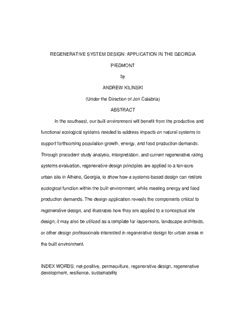
APPLICATION IN THE GEORGIA PIEDMONT by ANDREW KILINSKI PDF
Preview APPLICATION IN THE GEORGIA PIEDMONT by ANDREW KILINSKI
REGENERATIVE SYSTEM DESIGN: APPLICATION IN THE GEORGIA PIEDMONT by ANDREW KILINSKI (Under the Direction of Jon Calabria) ABSTRACT In the southeast, our built environment will benefit from the productive and functional ecological systems needed to address impacts on natural systems to support forthcoming population growth, energy, and food production demands. Through precedent study analysis, interpretation, and current regenerative rating systems evaluation, regenerative design principles are applied to a ten-acre urban site in Athens, Georgia, to show how a systems-based design can restore ecological function within the built environment, while meeting energy and food production demands. The design application reveals the components critical to regenerative design, and illustrates how they are applied to a conceptual site design; it may also be utilized as a template for laypersons, landscape architects, or other design professionals interested in regenerative design for urban areas in the built environment. INDEX WORDS: net-positive, permaculture, regenerative design, regenerative development, resilience, sustainability REGENERATIVE SYSTEM DESIGN: APPLICATION IN THE GEORGIA PIEDMONT by ANDREW KILINSKI BLA, UNIVERSITY OF GEORGIA, 2000 MLA, UNIVERSITY OF GEORGIA, 2015 A Thesis Submitted to the Graduate Faculty of The University of Georgia in Partial Fulfillment of the Requirements for the Degree MASTER OF LANDSCAPE ARCHITECTURE ATHENS, GEORGIA 2015 © 2015 Andrew Kilinski All Rights Reserved REGENERATIVE SYSTEM DESIGN: APPLICATION IN THE GEORGIA PIEDMONT by ANDREW KILINSKI Major Professor: Jon Calabria Committee: Robert Alfred Vick Thomas Lawrence Kerry Blind Electronic Version Approved: Suzanne Barbour Dean of the Graduate School The University of Georgia August 2015 ACKNOWLEDGEMENTS I would like to thank my family, friends, and co-workers for their support. I would also like to thank Jon Calabria, Alfie Vick, Tom Lawrence, Kerry Blind, Marianne Cramer, Bruce Ferguson, Donna Gabriel, Georgia Harrison, Darrel Morrison, Bill Reed, David Spooner, Alison Smith, Ron Thomas, and Melissa Tufts for graciously sharing their time, knowledge, support, and wisdom. iv TABLE OF CONTENTS Page ACKNOWLEDGEMENTS ..................................................................................... iv LIST OF TABLES ................................................................................................. ix LIST OF FIGURES ............................................................................................... x CHAPTER 1 INTRODUCTION .................................................................................. 1 Research Question ......................................................................... 2 Purpose and Significance of Research ........................................... 2 Methodology ................................................................................... 3 Precedent Studies ........................................................................... 4 Limitations and Delimitations .......................................................... 6 Thesis Structure .............................................................................. 6 2 PRINCIPLES OF REGENERATIVE DESIGN ...................................... 8 Introduction ..................................................................................... 8 Systems Thinking ............................................................................ 8 History of Regenerative Design....................................................... 9 Defining Regenerative Design....................................................... 10 Key Principles of Regenerative Design ......................................... 13 A Shifting Mindset ......................................................................... 16 Bioregionalism............................................................................... 16 Biophilia ........................................................................................ 17 Biomimicry .................................................................................... 18 v Interdisciplinary Approach ............................................................. 18 Criticism of Regenerative Design .................................................. 19 Summary ....................................................................................... 20 3 EVALUATION OF REGENERATIVE RATING SYSTEMS .................. 22 Introduction ................................................................................... 22 Rating Green, Sustainable, and Regenerative .............................. 22 Sustainable Sites Initiative ............................................................ 24 SITES Structure ............................................................................ 25 Certification ................................................................................... 27 Summary ....................................................................................... 27 The Living Building Challenge ....................................................... 27 LBC Structure................................................................................ 28 Certification ................................................................................... 30 Summary ....................................................................................... 31 Comparison ................................................................................... 31 4 PRECEDENT STUDIES IN REGENERATIVE DESIGN……………... 36 Introduction ................................................................................... 36 Lyle Center for Regenerative Studies ........................................... 37 Design Process ............................................................................. 37 Buildings…… ................................................................................ 39 Energy Use…. ............................................................................... 40 Water Management ....................................................................... 41 Site and Landscape ...................................................................... 42 vi Summary ....................................................................................... 43 The Willow School ......................................................................... 44 Design Process ............................................................................. 44 Buildings…… ................................................................................ 45 Water Management ....................................................................... 46 Site and Landscape ...................................................................... 47 Summary ....................................................................................... 48 Phipps Center for Sustainable Landscapes .................................. 48 Design Process ............................................................................. 49 Building and Energy Use ............................................................... 49 Water Management ....................................................................... 50 Site and Landscape ...................................................................... 52 Summary…. .................................................................................. 55 Conclusion .................................................................................... 55 5 APPLICATION OF REGENERATIVE DESIGN .................................. 57 Introduction and Site Context ........................................................ 57 Conceptual Site Design Program .................................................. 62 Site Analysis ................................................................................. 62 Conceptual Site Design ................................................................. 69 Buildings ....................................................................................... 74 Water Management ....................................................................... 75 Net-Positive Energy…. .................................................................. 77 Net-Positive Water ........................................................................ 78 vii Landscape .................................................................................... 79 Summary ....................................................................................... 80 6 DESIGN ANALYSIS ........................................................................... 82 REFERENCES ................................................................................................... 87 APPENDICES A SITES Scorecard application .............................................................. 94 B Project landscape plant list ................................................................. 95 viii LIST OF TABLES Page Table 1: Summary of Regenerative Design Principles ....................................... 21 Table 2: Living Building Challenge Imperatives .................................................. 30 Table 3: Fundamental Similarities Between Rating Systems ............................. 33 Table 4: Fundamental Differences Between Rating Systems ............................. 35 Table 5: Regenerative Design Strategies at the Lyle Center .............................. 38 Table 6: Summary of Regenerative Design Strategies ....................................... 56 Table 7: Summary of Regenerative Design Strategies for Design...................... 70 Table 8: Estimated Energy Use .......................................................................... 78 Table 9: Estimated Water Use ............................................................................ 79 ix
Description: